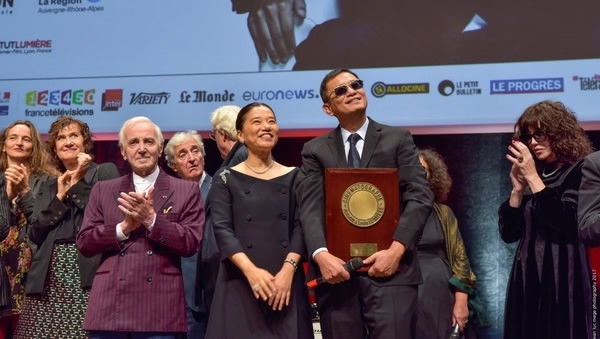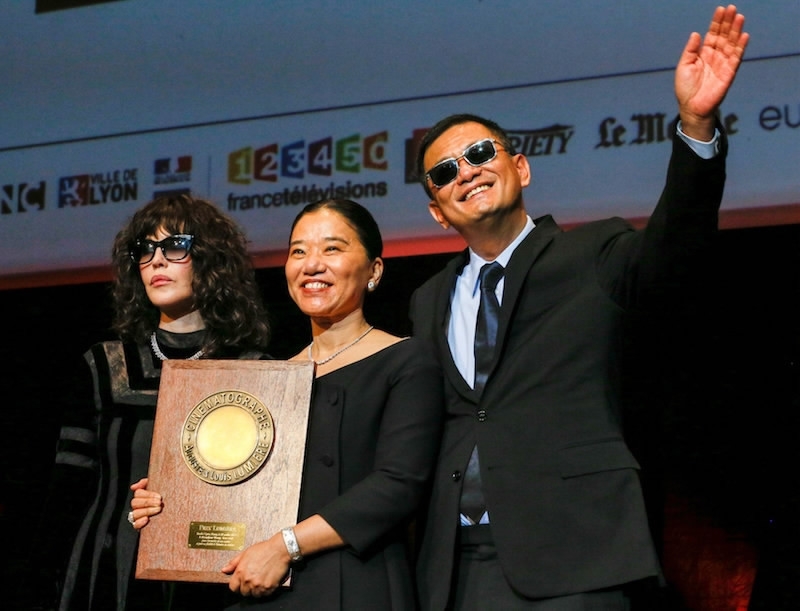
Culture
17:15, 23-Oct-2017
Wong Kar-wai honored at the 2017 Lumiere Film Festival
Josh McNally

Legendary director Wong Kar-wai was honored on Friday at the Lumiere Film Festival in Lyon. Founded by Thierry Fremaux in 2009, the festival has since paid tribute to such icons as Clint Eastwood, Martin Scorsese and Gerard Depardieu and now Wong, who becomes the first Hong Kong filmmaker to win what is often called the “Nobel prize for cinema.”
As part of the tribute to his work were speeches from luminaries including Zhang Ziyi, who collaborated with Wong on “2046” and his Ip Man biopic “The Grandmaster,” who said Wong “should get awards every day” and Olivier Assayas, the French director who was once married to Maggie Cheung, the star of Wong’s most famous film “In The Mood For Love.”
Most notable was the speech from notorious Hong Kong cinematographer and long-time Wong collaborator Christopher Doyle. Known for his mercurial temperament as much as his gorgeous cinematography, Doyle made waves in the industry when he walked off the set of “2046” during the shoot, getting replaced by Kwan Pun Leung. In an interview with The Guardian a year after the film’s release, he described “2046” as “unnecessary, in retrospect” and when asked about working with Wong again, he came across as recalcitrant, describing their famously lengthy and improvised filming schedules as feeling like a dog trying to cough up a hairball and wondering “how many five years do I have left?”

Isabelle Adjani, Esther Wong and Wong Kar-wai at the 2017 Lumiere Awards. /Reuters
Isabelle Adjani, Esther Wong and Wong Kar-wai at the 2017 Lumiere Awards. /Reuters
But on the weekend, over a decade since that interview, he said: “The pleasure of the process is why it takes five years. Five years later, you’re hearing ‘We have to go to Cannes.’”
At the end of the evening, Wong was given the prestigious gold plaque by Isabelle Adjani, who came on stage wearing big black sunglasses to pay homage to Wong’s trademark style – she skipped the Adidas track jacket, however. He appeared to be genuinely touched by the proceedings and gave credit to his wife, producer and “muse” Esther Wong. “Of all the great female characters I have created in my films, there are always glimpses of her there. That is why her name is always the first to appear on screen in all of my films.”
But it wasn’t all about nostalgia. When talking to journalists at the event, Wong spoke about his two upcoming projects. The first is a TV show from Amazon Studios called “Tong Wars” which centers on the Chinese-American experience and takes place over the course of several decades between 1905 and 1971. Switching to a rigidly scripted, long format series after a career of working on loose, poetic and visually focused movies is a major change for the filmmaker, however, he downplayed the differences between the media, saying “the format of a TV series just provides filmmakers with a bigger canvas to tell their stories.”

Wong Kar-wai, Zhang Ziyi, Song Hye-kyo and Tony Leung at the premiere of The Grandmaster. /Reuters
Wong Kar-wai, Zhang Ziyi, Song Hye-kyo and Tony Leung at the premiere of The Grandmaster. /Reuters
The other is an adaptation of Jin Yuchen’s novel “Blossoms”. As a literary period piece that manages to have been both long gestating and yet completely lacking in tangible pre-production – the only information available on IMDb is that it will star the ubiquitous Kris Wu – the film already feels like a traditional WKW project, even if it is set in Shanghai.
Wong’s previous film, “The Grandmaster” was his first mainland Chinese production and starred Tony Leung as Ip Man, the Wing Chun master who went on to train Wong’s childhood icon Bruce Lee. Without the dreamy aesthetics of Christopher Doyle – who was replaced by Philippe Le Sourd – and functioning primarily as a traditional biopic, it was too simple and streamlined when compared to his early work, making the film come across more like a mea culpa to his producers for the box office failure of “2046” than a calling card to the mainland Chinese industry.
The festival ended with a screening of “Fallen Angels”, the underrated 1995 follow up/companion piece to “Chungking Express”.

SITEMAP
Copyright © 2018 CGTN. Beijing ICP prepared NO.16065310-3
Copyright © 2018 CGTN. Beijing ICP prepared NO.16065310-3